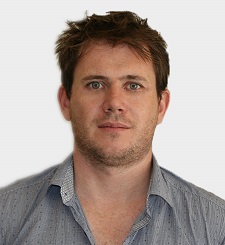Developing a tool for screening for allergy that will improve drug development
AIFA Research Grant 2016
Targeting the high affinity IgE receptor - developing reporter cell lines of FcER1 signalling for drug screening.
Dr Roediger, Head of Skin Inflammation Group, Centenary Institute, New South Wales.

Reversing the rise of allergies is an important unmet challenge of modern medicine and a problem that Dr Ben Roediger seeks to address. Dr Roediger has been awarded an AIFA grant of $10,000. His project has the potential to lead to better treatment for many types of allergy. He admits it is an ambitious project.
Recent research has provided an excellent understanding of how allergy works at a cellular and molecular level. Immunoglobulin E (IgE) binds to allergens in the environment, which activates a receptor called FcER1. Despite knowing the critical role this process plays in allergic reactions, there are no drugs that specifically target the FcER1 receptor.
Screening for new drugs is limited by the nature of the assays (tests) used to develop them. Very few assays are designed with allergy in mind, which has held back the development of highly targeted drugs that could help sufferers of allergic disease. Most drugs that treat allergic conditions act broadly, carpet bombing the problem and causing other collateral damage or side effects. Currently, there is an urgent unmet need for the development of highly targeted drugs that could help sufferers of allergic disease with few side effects.
The innovative tool is a novel cell line that makes use of fluorescence to shed light on the dynamics of protein interactions that drive allergic reactions. A fluorescence-based technology known as BiFC (bimolecular fluorescence complementation) will enable scientists to directly study the FcER1 receptor and fast track drug development for the treatment of allergic disease. This project may also serve as a template for future drug screening strategies targeting other diseases.
Dr Ben Roediger combines cutting edge technology with sophisticated models to visualise and functionally characterise immune cell function. He has over 10 years' experience in biomedical research, with a broad understanding of cell biology, haematopoiesis, inflammation and immunology and a primary research focus on understanding atopic disease, particularly atopy in children.
Dr Roediger is an acknowledged expert in cutaneous immunology whose research contributions are evidenced by 23 original articles (16 in the last 5 years), the majority of which are in leading international journals including Nature Immunology, The Journal of Experimental Medicine, Proceedings of the National Academy of Sciences of the USA, Journal of Investigative Dermatology and Journal of Immunology.
AIFA is proud to recognise the potential importance of Dr Roediger's work.

